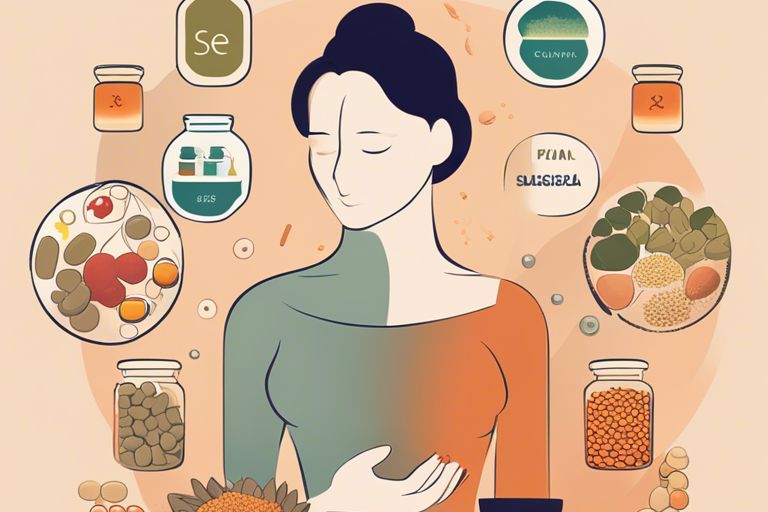Palpitations, hot flashes, and mood swings are common symptoms of menopause that can wreak havoc on your daily life. If you’re looking for natural ways to alleviate these symptoms and support hormone balance, nutritional supplements may be a valuable addition to your regimen. While it’s crucial to consult with a healthcare professional before incorporating any new supplements into your routine, there are several options that have shown promise in assisting with hormone regulation during menopause.
Understanding Menopause and Hormone Imbalance
By the time you reach your 40s or 50s, you may start experiencing the symptoms of menopause. Menopause is a natural biological process that occurs in women as they age, typically around the age of 50. During this transition, your body undergoes significant hormonal changes, leading to symptoms such as hot flashes, mood swings, and changes in your menstrual cycle. These changes can also lead to hormone imbalance, which can have a significant impact on your overall health and well-being.
Biological changes during menopause
As you approach menopause, your ovaries produce less estrogen and progesterone, the hormones responsible for regulating your menstrual cycle and fertility. This decline in hormone production can result in irregular periods and eventually lead to the cessation of menstruation. In addition, the decrease in estrogen levels can also lead to changes in your body composition, including a loss of bone density and an increased risk of heart disease.
Symptoms and health implications of hormone imbalance
As your hormone levels fluctuate during menopause, you may experience a range of symptoms such as hot flashes, night sweats, vaginal dryness, and mood swings. These symptoms can significantly impact your quality of life and overall well-being. In addition, hormone imbalance during menopause has been linked to an increased risk of osteoporosis, cardiovascular disease, and cognitive decline. It is important to address hormone imbalance during menopause to minimize the impact on your health.
Nutritional Supplements for Hormone Balance
Obviously, nutritional supplements can play a key role in helping to balance hormones in menopausal women. They can offer a natural way to support your body during this transitional phase of life. For a detailed look at the best vitamins and supplements to aid in hormone balance, check out this article on 7 Best Vitamins and Supplements to Balance Hormones in Women.
Types of supplements and their roles
When it comes to hormone balance, there are several types of supplements that can be beneficial. Vitamin D is essential for overall hormonal health and can help reduce the risk of certain diseases. Vitamin B6 is important for regulating your mood and reducing symptoms of PMS and menopause. Omega-3 fatty acids can help reduce inflammation and support hormonal balance. Black cohosh has been used to alleviate hot flashes and improve sleep quality during menopause. Soy isoflavones may also help with menopausal symptoms, as they mimic the effects of estrogen in the body. Though it’s crucial to consult with your healthcare provider before starting any new supplements.
| Vitamin D | Essential for overall hormonal health |
| Vitamin B6 | Regulates mood and reduces PMS and menopausal symptoms |
| Omega-3 fatty acids | Reduces inflammation and supports hormonal balance |
| Black cohosh | Alleviates hot flashes and improves sleep quality |
| Soy isoflavones | Mimics the effects of estrogen in the body |
Though it’s crucial to consult with your healthcare provider before starting any new supplements.
Efficacy and safety of popular supplements
When considering supplements for hormone balance, it’s important to prioritize safety and efficacy. Vitamin D and Vitamin B6 are generally safe when taken in recommended doses, but excessive intake can lead to toxicity. Omega-3 fatty acids are well-tolerated, but high doses can thin the blood, so caution is advised for individuals taking blood-thinning medications. Black cohosh can cause liver damage in some individuals, so it’s important to discuss this supplement with your healthcare provider. Soy isoflavones may interfere with certain medications, so it’s important to consult with your doctor before adding them to your regimen.
Integrating Nutritional Supplements into a Healthy Lifestyle
Lastly, integrating nutritional supplements into your healthy lifestyle can aid in hormone balance for menopausal women. These supplements can provide essential vitamins and minerals that your body may be lacking, helping to support hormone production and regulation. You can find more information on specific supplements to balance hormones here.
Diet considerations for menopausal women
When it comes to your diet, it’s important to focus on consuming a variety of nutrient-dense foods. Include plenty of fruits, vegetables, whole grains, and lean proteins in your meals to support overall health and well-being during menopause. Additionally, incorporating foods rich in omega-3 fatty acids can help reduce inflammation and support hormonal balance.
Holistic approaches: Exercise, stress management, and sleep
Integrating holistic approaches into your lifestyle, such as regular exercise, stress management techniques, and prioritizing quality sleep, can also have a positive impact on hormone balance. Engaging in physical activity helps maintain a healthy weight and can reduce the severity of menopausal symptoms. Managing stress through techniques like yoga, meditation, or deep breathing exercises can help regulate hormone levels. And prioritizing adequate sleep is crucial for overall hormone balance and well-being.
Case Studies and Clinical Evidence
To get a better understanding of how nutritional supplements can aid in hormone balance for menopausal women, let’s take a look at some case studies and clinical evidence.
- A study conducted by the Department of Obstetrics and Gynecology at the Medical University of Vienna found that supplementation with certain vitamins and minerals significantly improved hormone levels in menopausal women.
- Research published in the Journal of the American Medical Association showed that phytoestrogen supplements helped alleviate menopausal symptoms in a majority of the study participants.
- In a clinical trial by the National Institutes of Health, omega-3 fatty acid supplementation was found to be effective in reducing hot flashes and night sweats in menopausal women.
To read more on the best supplements for hormone balance, you can visit What Supplement is Good for Balancing Hormones?
Success stories of menopausal women using supplements
Many women have experienced success in managing their menopausal symptoms through nutritional supplementation. By incorporating specific vitamins, minerals, and herbal remedies into their daily routine, they have found relief from hot flashes, mood swings, and insomnia.
Scientific research and current findings
Scientific research continues to support the use of natural supplements as a safe and effective approach to hormone balance during menopause. Current findings indicate that certain herbal remedies and nutritional supplements can help alleviate menopausal symptoms without the need for hormone replacement therapy.

Can nutritional supplements aid in hormone balance for menopausal women?
To wrap up, while nutritional supplements may offer some support in managing hormone balance during menopause, it’s important to consult with a healthcare professional before starting any new regimen. Your individual needs and health history should be taken into account, and a tailored approach to supplementation and hormone management is crucial. Keep in mind that while supplements can be beneficial, they are not a substitute for overall healthy lifestyle choices and any other treatments recommended by your healthcare provider. By working closely with your doctor, you can find the best approach to hormone balance during menopause.


